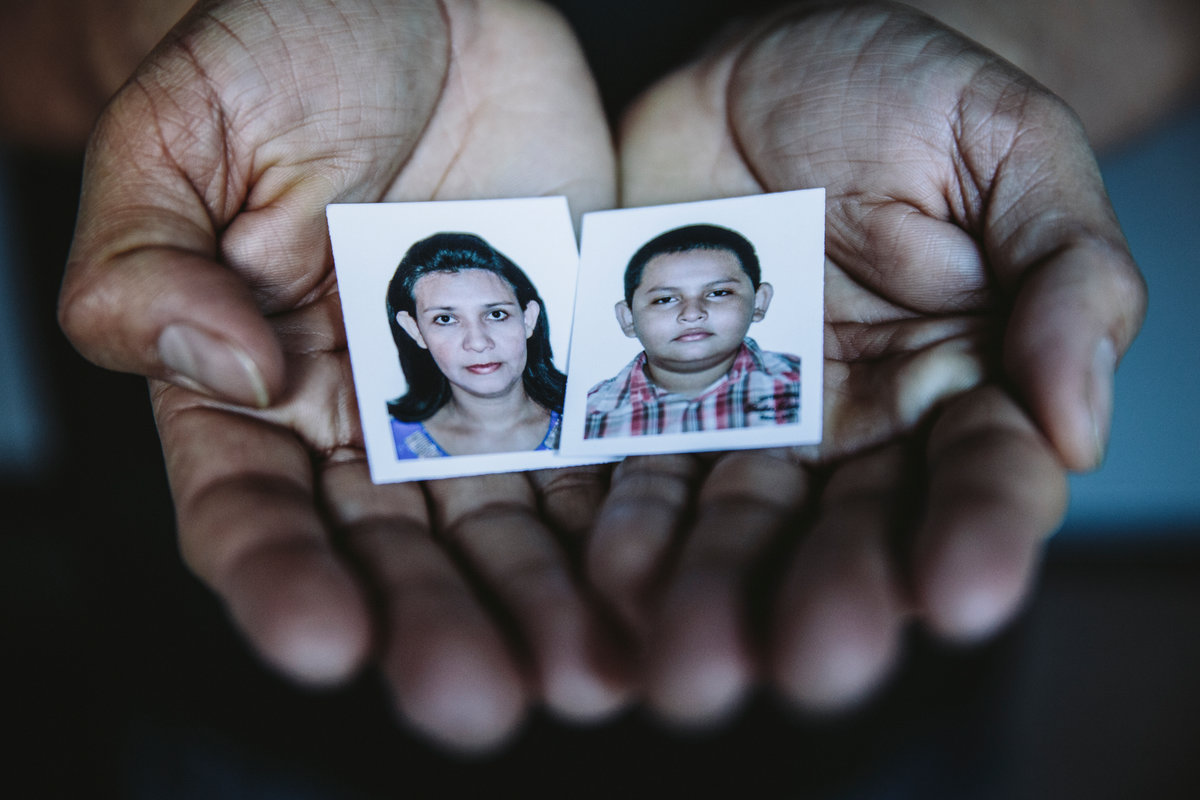If you can navigate your way through the political rhetoric on immigration, you’ll find real people trying desperately to survive – and if they’re lucky, maybe even thrive – at a time when all the odds seem stacked against them. The immigration clients of the University of St. Thomas Legal Services Clinic are just some of the people behind the debate that has captured the nation’s attention since November. Here, we share a few of their stories through images, and in the words of the law students who helped them.

“ALBERTO”
“Alberto” hasn’t seen his wife and young son in five years. He left his home in Central America in 2012 after observing and reporting serious police misconduct there. He came to the Legal Services Clinic in 2013 on a referral from Advocates for Human Rights. He applied for and was denied asylum, but was granted relief through the Convention against Torture, an international human rights treaty. He currently is working with the International Institute of Minnesota to bring his family to the United States.

Nicholas Kimball '14 J.D.
“He had such incredible courage and strength throughout our time working together. We told him early on that a lot would rest on how he told his story, and he really responded. He worked incredibly hard in the lead-up to our day in court. Lawyers can sometimes feel like they care more about a case than their client, but that was never something we contemplated with him.”
– Nicholas Kimball ’14, who worked on “Alberto’s” case in 2013 and 2014
“I still remember how torn ‘Alberto’ was in leaving his wife and son, not knowing if they were safe, or if/when he’d ever be able to see them again. He had a simple, but happy life back in Central America, and to give that up – to give up his family – truly meant he had no other option. I don’t think many people understand that internal struggle that people like him go through when they think of the people fleeing Central America and coming to the U.S. today.”
– Beatriz Marrinan ’14, who worked on “Alberto’s” case as a student in 2013 and 2014, and as a staff member through 2016

LALA

Joy Nissen Beitzel '14 J.D.
Originally from Liberia, Lala married a U.S. citizen and later found herself in an unsafe home situation. She was referred to the Legal Services Clinic in 2012 by an Episcopalian social services agency. Clinical student attorneys worked with her to file a Violence Against Women Act petition and apply for a green card. Lala received her green card four years later, in March 2016.
“Lala had experienced some real trauma, and re-telling her story so that we could advocate for her elicited some strong emotions. I learned to be comfortable with absorbing some of the client’s emotion while also analyzing her legal options. This is a skill I use nearly every day in my current practice of family law. It’s my job to be calm, honest and thorough.”
– Joy Nissen Beitzel ’14, who worked on Lala’s case in 2012

Assad Amini '16 J.D.
“I still remember the hopeful smile on Lala’s face when she was leaving the clinic, and that has stuck with me as a reminder to do the best I can do for my clients. A great attorney is not just competent; a great attorney is also compassionate and caring, and remembers the importance of their service to the client. To this day, I make sure to keep in mind that practicing the law is about more than just the law; it is about the clients first and foremost. There are many different kinds of clients (rich, poor, humans, corporations, the government and so on), but they all have something in common: the need for access to justice, even though for some, more is at stake than the others.”
– Assad Amini ’16, who worked on Lala’s case in 2015


Alison Griffith '14 J.D.
PATRICIA AND THABISO
Born to Zimbabwean parents, Patricia escaped xenophobia in her home country of South Africa and arrived in the United States with her son, Thabiso, now 8, by way of Central America. The Legal Services Clinic helped her with complicated questions of citizenship in both Zimbabwe and South Africa, filing an asylum application and getting her work renewals in place. Social work students working in the University of St. Thomas Interprofessional Center for Counseling and Legal Services also supported Patricia in her efforts to find employment and child care.
“Patricia’s resilience, perseverance and positivity in the face of enormous challenges were such an inspiration to me, and continue to inspire me years later. In representing my clients, I remember the dignity and grace with which she approached unimaginably difficult experiences of flight to the U.S. and applying for asylum here, and try to achieve some modicum of that spirit.”
– Alison Griffith ’14, who worked on Patricia’s case in 2013 and 2014

MILLET
Fifteen-year-old Millet was born in Mexico, but became separated from her mother at the border. She came to Minnesota to live with an aunt and uncle, and was receiving therapy from social work students in the Interprofessional Center in 2014 when she was referred to the Legal Services Clinic. With the help of clinical student attorneys, she applied for special immigrant juvenile status, adjustment of status and a work permit in March 2016, and is awaiting final approval of permanent residence.
“[This experience] helped prepare me to be a lawyer by introducing me to some of the most resilient people I’ve ever met, which encourages me to continue pushing forward despite disappointing outcomes. I came to law school with a strong interest in all aspects of immigration law, which is why I applied to work as a student attorney for U.S. Immigration and Customs Enforcement. By being part of the clinic for a year prior to starting with ICE in August, I see the respondents as people with stories, but also recognize what the law allows.”
– Kelsey Allen ’17, who worked on Millet’s case in 2015 and 2016
Read more from St. Thomas Lawyer.







